雅思定语从句
- 格式:doc
- 大小:119.00 KB
- 文档页数:13
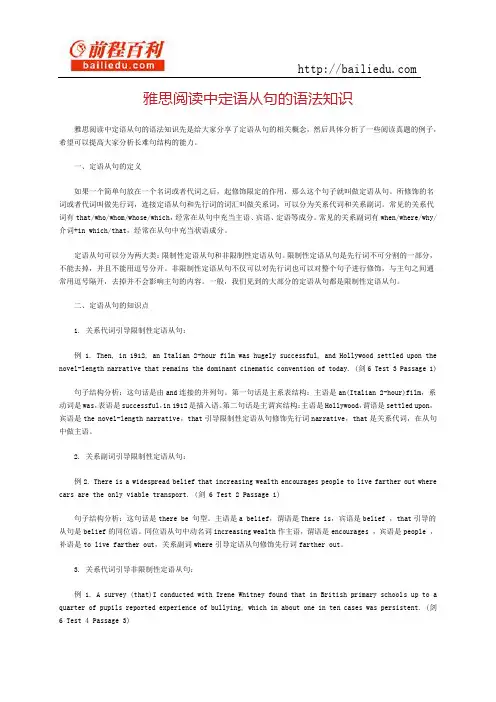
雅思阅读中定语从句的语法知识先是给大家分享了定语从句的相关概念,然后具体分析了一些阅读真题的例子,希望可以提高大家分析长难句结构的能力。
一、定语从句的定义如果一个简单句放在一个名词或者代词之后,起修饰限定的作用,那么这个句子就叫做定语从句。
所修饰的名词或者代词叫做先行词,连接定语从句和先行词的词汇叫做关系词,可以分为关系代词和关系副词。
常见的关系代词有that/who/whom/whose/which,经常在从句中充当主语、宾语、定语等成分。
常见的关系副词有when/where/why/介词+in which/that,经常在从句中充当状语成分。
定语从句可以分为两大类:限制性定语从句和非限制性定语从句。
限制性定语从句是先行词不可分割的一部分,不能去掉,并且不能用逗号分开。
非限制性定语从句不仅可以对先行词也可以对整个句子进行修饰,与主句之间通常用逗号隔开,去掉并不会影响主句的内容。
一般,我们见到的大部分的定语从句都是限制性定语从句。
二、定语从句的知识点1. 关系代词引导限制性定语从句:例 1. Then, in 1912, an Italian 2-hour film was hugely successful, and Hollywood settled upon the novel-length narrative that remains the dominant cinematic convention of today. (剑6 Test 3 Passage 1)句子结构分析:这句话是由and连接的并列句。
第一句话是主系表结构:主语是an(Italian 2-hour)film,系动词是was,表语是successful,in 1912是插入语。
第二句话是主谓宾结构:主语是Hollywood,谓语是settled upon,宾语是the novel-length narrative,that引导限制性定语从句修饰先行词narrative,that是关系代词,在从句中做主语。
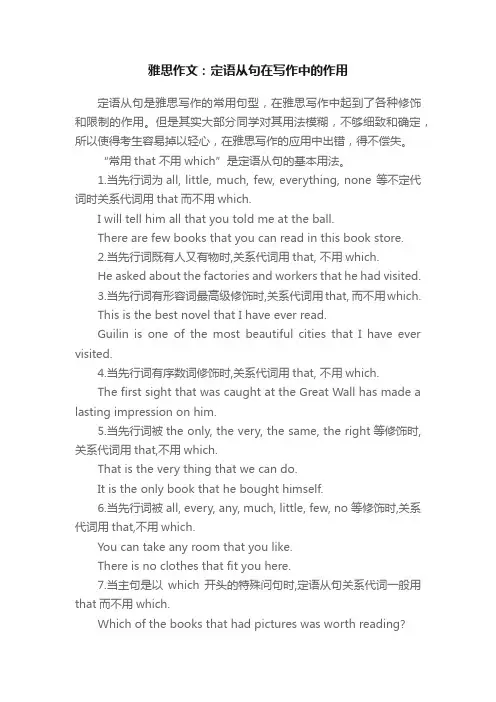
雅思作文:定语从句在写作中的作用定语从句是雅思写作的常用句型,在雅思写作中起到了各种修饰和限制的作用。
但是其实大部分同学对其用法模糊,不够细致和确定,所以使得考生容易掉以轻心,在雅思写作的应用中出错,得不偿失。
“常用that 不用which”是定语从句的基本用法。
1.当先行词为all, little, much, few, everything, none 等不定代词时关系代词用that而不用which.I will tell him all that you told me at the ball.There are few books that you can read in this book store.2.当先行词既有人又有物时,关系代词用that, 不用which.He asked about the factories and workers that he had visited.3.当先行词有形容词最高级修饰时,关系代词用that, 而不用which.This is the best novel that I have ever read.Guilin is one of the most beautiful cities that I have ever visited.4.当先行词有序数词修饰时,关系代词用that, 不用which.The first sight that was caught at the Great Wall has made a lasting impression on him.5.当先行词被the only, the very, the same, the right等修饰时,关系代词用that,不用which.That is the very thing that we can do.It is the only book that he bought himself.6.当先行词被all, every, any, much, little, few, no等修饰时,关系代词用that,不用which.You can take any room that you like.There is no clothes that fit you here.7.当主句是以which开头的特殊问句时,定语从句关系代词一般用that而不用which.Which of the books that had pictures was worth reading?8.在强调句型" It is ... that ..." 中,只用that,不用which.It is in this room that he was born twenty years ago.9.在" such (the same) ... as ..." 句型中,关系代词要用as, 而不用which.We need such materials as (not which) can bear high temperature.10.表示" 正如... 那样 "," 正象..." 之意时, 用as, 不用which.Mary was late again, as had been expected.11.As 引导的定语从句可以放在主句前面, 也可以放在主句后面或主句中间,而由which引导的定语从句只能放在主句后面。
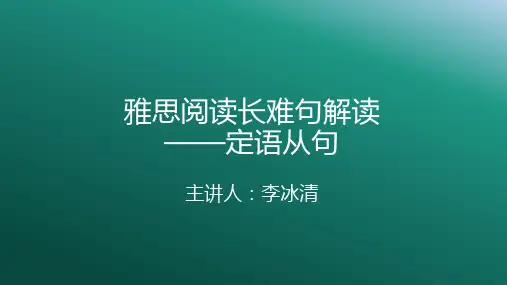
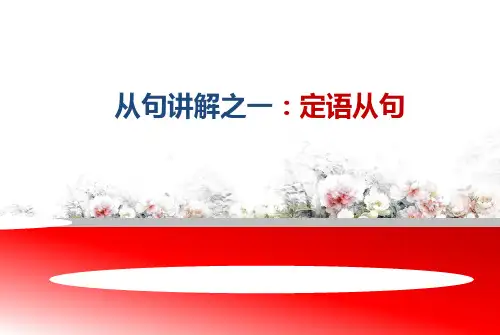
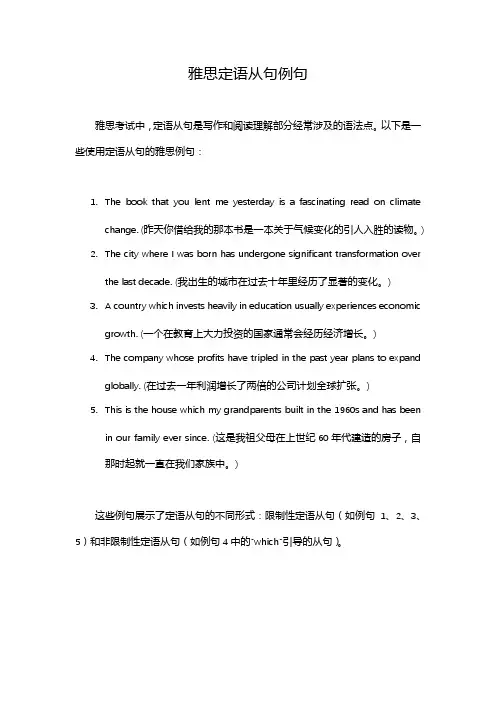
雅思定语从句例句
雅思考试中,定语从句是写作和阅读理解部分经常涉及的语法点。
以下是一些使用定语从句的雅思例句:
1.The book that you lent me yesterday is a fascinating read on climate
change. (昨天你借给我的那本书是一本关于气候变化的引人入胜的读物。
)
2.The city where I was born has undergone significant transformation over
the last decade. (我出生的城市在过去十年里经历了显著的变化。
)
3. A country which invests heavily in education usually experiences economic
growth. (一个在教育上大力投资的国家通常会经历经济增长。
)
4.The company whose profits have tripled in the past year plans to expand
globally. (在过去一年利润增长了两倍的公司计划全球扩张。
)
5.This is the house which my grandparents built in the 1960s and has been
in our family ever since. (这是我祖父母在上世纪60年代建造的房子,自
那时起就一直在我们家族中。
)
这些例句展示了定语从句的不同形式:限制性定语从句(如例句1、2、3、5)和非限制性定语从句(如例句4中的"which"引导的从句)。
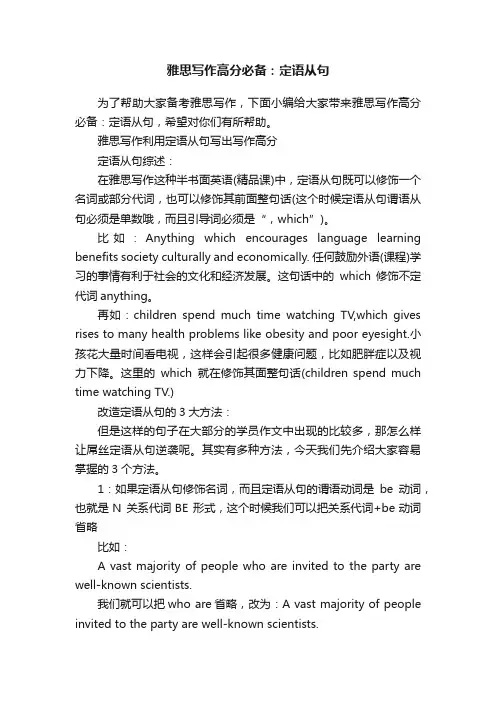
雅思写作高分必备:定语从句为了帮助大家备考雅思写作,下面小编给大家带来雅思写作高分必备:定语从句,希望对你们有所帮助。
雅思写作利用定语从句写出写作高分定语从句综述:在雅思写作这种半书面英语(精品课)中,定语从句既可以修饰一个名词或部分代词,也可以修饰其前面整句话(这个时候定语从句谓语从句必须是单数哦,而且引导词必须是“,which”)。
比如:Anything which encourages language learning benefits society culturally and economically. 任何鼓励外语(课程)学习的事情有利于社会的文化和经济发展。
这句话中的which 修饰不定代词anything。
再如:children spend much time watching TV,which gives rises to many health problems like obesity and poor eyesight.小孩花大量时间看电视,这样会引起很多健康问题,比如肥胖症以及视力下降。
这里的which就在修饰其面整句话(children spend much time watching TV.)改造定语从句的3大方法:但是这样的句子在大部分的学员作文中出现的比较多,那怎么样让屌丝定语从句逆袭呢。
其实有多种方法,今天我们先介绍大家容易掌握的3个方法。
1:如果定语从句修饰名词,而且定语从句的谓语动词是be动词,也就是N 关系代词BE 形式,这个时候我们可以把关系代词+be动词省略比如:A vast majority of people who are invited to the party are well-known scientists.我们就可以把who are省略,改为:A vast majority of people invited to the party are well-known scientists.这样我们就把原来普通的定语从句做定语改为了过去分词(非谓语结构的一种)做定语,而分词在书面英语中是一种常用而且比较书面的语法结构,所以建议想考6分以上的烤鸭们多多使用。
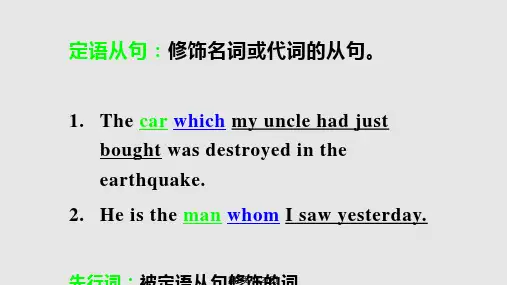

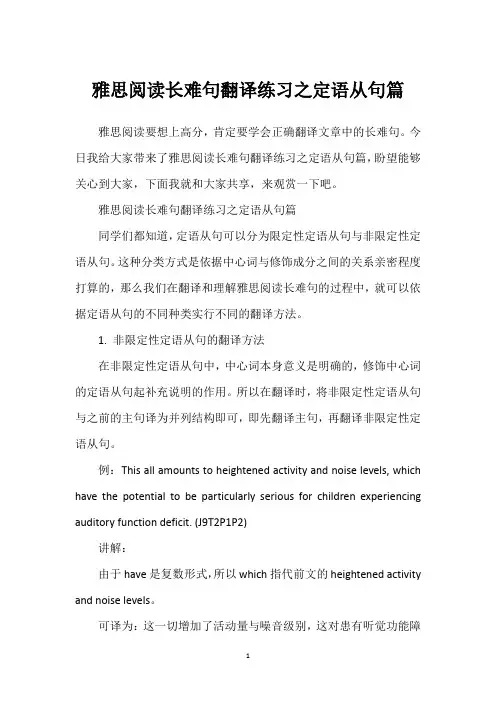
雅思阅读长难句翻译练习之定语从句篇雅思阅读要想上高分,肯定要学会正确翻译文章中的长难句。
今日我给大家带来了雅思阅读长难句翻译练习之定语从句篇,盼望能够关心到大家,下面我就和大家共享,来观赏一下吧。
雅思阅读长难句翻译练习之定语从句篇同学们都知道,定语从句可以分为限定性定语从句与非限定性定语从句。
这种分类方式是依据中心词与修饰成分之间的关系亲密程度打算的,那么我们在翻译和理解雅思阅读长难句的过程中,就可以依据定语从句的不同种类实行不同的翻译方法。
1. 非限定性定语从句的翻译方法在非限定性定语从句中,中心词本身意义是明确的,修饰中心词的定语从句起补充说明的作用。
所以在翻译时,将非限定性定语从句与之前的主句译为并列结构即可,即先翻译主句,再翻译非限定性定语从句。
例:This all amounts to heightened activity and noise levels, which have the potential to be particularly serious for children experiencing auditory function deficit. (J9T2P1P2)讲解:由于have是复数形式,所以which指代前文的heightened activity and noise levels。
可译为:这一切增加了活动量与噪音级别,这对患有听觉功能障碍的孩子有潜在的严峻影响。
但是‘这’在中文中指代抽象,所以虽然句子成分分析精确,但是仍旧不能理解句子和含义。
修改如下:这一切增加了活动量与噪音级别,增加了的活动量和噪音量对患有听觉功能障碍的孩子有潜在的严峻影响。
2. 较短的限定性定语从句在多数限定性定语从句中,中心词本身的意义不够明确的,需要定语从句修饰后才能确定精确含义。
因此在翻译一般的限定性定语从句时,将定语从句像一般的定语一样翻译到中心词之前就可以了。
留意,适用于这种翻译方法的定语从句长度一般较短。
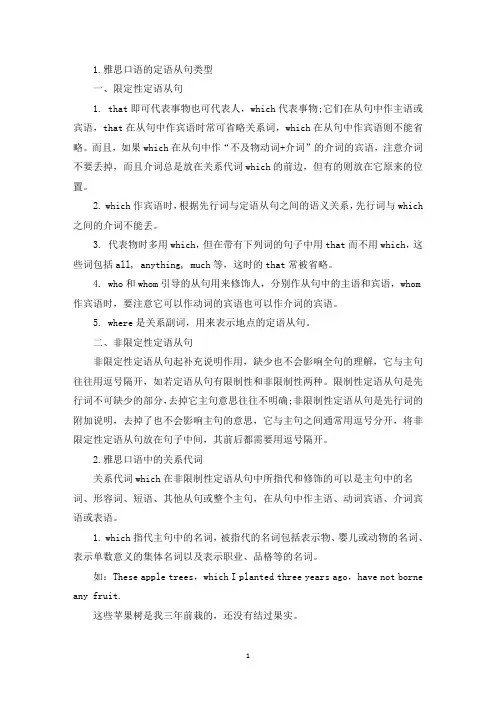
1.雅思口语的定语从句类型一、限定性定语从句1. that即可代表事物也可代表人,which代表事物;它们在从句中作主语或宾语,that在从句中作宾语时常可省略关系词,which在从句中作宾语则不能省略。
而且,如果which在从句中作“不及物动词+介词”的介词的宾语,注意介词不要丢掉,而且介词总是放在关系代词which的前边,但有的则放在它原来的位置。
2. which作宾语时,根据先行词与定语从句之间的语义关系,先行词与which 之间的介词不能丢。
3. 代表物时多用which,但在带有下列词的句子中用that而不用which,这些词包括all, anything, much等,这时的that常被省略。
4. who和whom引导的从句用来修饰人,分别作从句中的主语和宾语,whom 作宾语时,要注意它可以作动词的宾语也可以作介词的宾语。
5. where是关系副词,用来表示地点的定语从句。
二、非限定性定语从句非限定性定语从句起补充说明作用,缺少也不会影响全句的理解,它与主句往往用逗号隔开,如若定语从句有限制性和非限制性两种。
限制性定语从句是先行词不可缺少的部分,去掉它主句意思往往不明确;非限制性定语从句是先行词的附加说明,去掉了也不会影响主句的意思,它与主句之间通常用逗号分开,将非限定性定语从句放在句子中间,其前后都需要用逗号隔开。
2.雅思口语中的关系代词关系代词which在非限制性定语从句中所指代和修饰的可以是主句中的名词、形容词、短语、其他从句或整个主句,在从句中作主语、动词宾语、介词宾语或表语。
1. which指代主句中的名词,被指代的名词包括表示物、婴儿或动物的名词、表示单数意义的集体名词以及表示职业、品格等的名词。
如:These apple trees,which I planted three years ago,have not borne any fruit.这些苹果树是我三年前栽的,还没有结过果实。
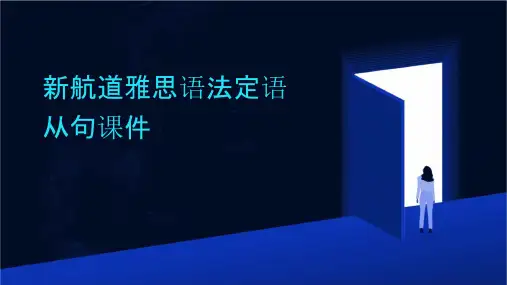
雅思写作高分的定语从句详析雅思写作高分必备的定语从句详析定语从句,绝对的雅思写作高分作文必备。
它可以把几个充满屌丝气息的短句子瞬间连成一个高端大气上档次的长难句。
它可以准确巧妙的对名词或者名词短语做出锦上添花的限定或者修饰。
为了写出高分作文,首先我们需要来认识一下常见的关系代词(relative pronouns)who ——用来指人The students, who have acquired practical skills, can hunt for jobs in a short time.Some people believe that innate talent is what differentiates a person who has been trained to play a sport or an instrument, from those who become good players.As the policy would also affect the cost of public transport, it would be very unpopular with everyone who needs to travel on the roads.which ——用来指物France used coal as a source for only 25 units of electricity in 1980, which was matched by natural gas.But by 2000 nuclear power, which was not used at all in Australia, had developed into the main source, producing almost 75% of electricity, at 126 units.that ——用来指人或物I personally think that some people do have talents that are probably inherited via their genes.But there are various other measures that could be implemented that would have a huge effect on these problems.It takes ten days for each egg to become a silkworm larva that feeds on mulberry leaves.Find someone thatcan assist the students to improve their social skills.where ——用来指地方The biggest gender difference is at the lowest post-school level, where 90% of those who held a skilled vocational diploma were men.when ——用来指时间This cost decreased to only 5% of total expenditure in 1991 but rose dramatically in 2001 when it represented 23% of the school budget.whose ——用来指所有The result was a remarkably cohesive ensemble whose members seemed to have telepathic powers of communication.Consumers, whose purchases account for about 70% of economic activity, face a variety of challenges.why——用在the reason / reasons 后面The pie chart shows the main reasons why agricultural land becomes less productive.There are two important reasons why the Underground is safer than the overground railways.限定性定语从句:1.在名词后面给出限定名词的信息。
雅思考试语法:定语从句一、雅思考试定语从句的概念用一个主谓结构完整的句子作定语(定语的两种形式adj+n/n+定语从句),修饰前面的名词,代词,短语,甚至是整个句子的从句。
简单来说就是把从句放在某个单词/词组/句子后面来对其进行修饰。
二、雅思考试定语从句:两个首先必须明确的概念雅思考试定语从句必须先明确先行词和关系词。
Kung Fu Panda is the best cartoon movie(先行词)that/which(关系词)I have watched this year.注意:先行词未必永远都是定语从句之前的那一个单词,有的时候先行词与定语从句之间插入了别的成份,这个时候就必须通过上下文意思来寻找先行词。
(阅读)There has been a significant increase in the number of women with dependent children who are in the paid workforce in Australia.Q: Which group of people has seen a significant increase in number in Australia?三. 雅思考试定语从句的分类定语从句可以分为限制性定语从句和非限制性定语从句两大类。
限制性定语从句:England was one of the first countries where scientists adopted and publicized Copernican ideas(哥白尼学说)with enthusiasm.(剑桥5 Test2 Reading Passage3)(阅读)One new keyboard included keys which produced letters which frequently occur together in English, like“–ing”and“–th”and“–ed”, so the word “thing”would take two strokes to write instead of five.特点:(1). 从句对先行词起限制作用,说明先行词必须如此,不能超出这个限制。
雅思阅读中的定语从句雅思阅读中的定语从句应该注意的问题指出关系代词(副词)在定语从句中的成份:1.themanwhocametoourschoolismr.wang.(主语)2.thegirl(whom)imetislucy.(定语)3.achildwhoseparentsaredeadiscalledtom.(定语)4.ilikethebook(which)youboughtyesterday.(定语)一、引导定语从句的关系词指代人who,whom,that指代事物which,that,as所属关系whose,ofwhich指地点where指时间when指原因why二、关系代词that和which在很多情况下可以互换,但下列情况只用that。
allthatcanbedonehasbeendone.doyouhaveanythingthatyoudon’tunderstand?thereislittlethatcanbebelievedaboutit.thebookdoesn’tsaymuchthatamuseschildren.先行词是all,everything,nothing,anything,something,much,little,none等不定代词,引导定语从句用that。
hamburgisthemostbeautifulcitythati’veeverseen.thisisthebesttvthatismadeinchina.thefirstmuseumthathevisitedinchinawasthehistorymuseum.先行词被形容词最高级或序数词修饰时,引导定语从句用that。
i’vereadallthebooksthatyoulentme.nosamplethatwenavereceivedissatisfactory.pleasesendusanyinformationthatyouhaveaboutthesubject.heistheonlypersonthatwaspresentatthetime.先行词被any,some,no,much,few,little,every,all,very,only,last 修饰时,引导定语从句用that。
雅思英语语法精华——定语从句详解青梦家——致力于打造青年人的服务平台,提供国际语言培训、就业辅导、创业支持和留学服务的一站式解决方案定语从句概念概念:定语从句又称关系从句,用来修饰一个名词,代词或者一个句子。
She is my classmate.My classmate is clever.She is my classmate who is clever.先行词关系词关系词的分类:关系代词:that, which , who , whom , whose关系副词:when, where , why, what随堂练习请找出下面句子中的定语从句一I have a book which comes from my father.分析:用来修饰的从句,就是定语从句,从这里我们能看出which comes from my father是用来修饰book的,所以是定语从句,而book就是被修饰的先行词。
二Do you know the man who spoke at the meetingjust now?分析:可以通过找关系词的方法去找定语从句,这里关系词是who,而且通过理解句子我们发现who spoke at the meeting justnow就是用来形容the man的,所以是定语从句,而the man是被修饰的先行词。
三It was ameeting whose importance I did not realized at that time.分析:主句是It was a meeting,意思是“这是一个会议”,是什么样的一种会议呢?就是后面的whose importance I did not realized at that time,即“在那时我没有意识到重要性的会议”,用来形容和修饰会议了,所以是定语从句。
我们会发现,定语从句就跟形容词一样,只不过以从句的形式来体现。
Whose表示“谁的”,既可以指人的,也可以指物的,所以这里可以用。
定语从句写作练习1 许多人谈论的一个最严重的问题集中在缺乏足够的居住空间(center on)2 任何忽视这一点的政府都将付出巨大的代价(be blind to)3 对于那些想过上健康而有意义的生活的人们来说,找时间学习一些新知识是很重要的,正如那句老话:活到老学到老(just as an old saying goes)4 同时仍然有许多人持有传统的观点认为全日制学校对孩子的学习发挥着极其重要的作用(live under the traditional ideas)5 同时,拥有私家轿车的数量在这几年快速地增加6 违反交通规则的人应该受到惩罚(violate traffic regulations)7 夏天很闷热,这就是我不喜欢它的原因(sultry)8 最后一点,森林是人类可以接近自然的地方,如果人类学会了爱护自然,就会想保存地球上所有的天然资源(get close to)9 另一方面,那些坚持自己本国风俗习惯的人,觉得这样做让他们更加自在(follow their own customs feel more at home)10 沉迷于网络的人经常觉得孤独,感到与外面的世界隔绝开来,变得越来越内向和自闭(indulge in isolated withdrawn )11 经常沉迷于电视的小孩不懂得区分现实和虚幻(reality fantasy)12 沉迷于上网的孩子往往比较内向,不善交际,甚至对人冷漠(unsociable indifferent)13 死刑是个野蛮的做法,应该从现代社会中清除(death penalty cruel and barbaric do away with)14 那些反对强制退休制度的人持有以下理由(mandatory retirement)15 取得巨大成功的人,毫无例外,都是善于利用零碎时间的人(with no exception utilize their own odd moments wisely)16 我喜欢到气候宜人的地方生活(agreeable)17 博物馆是游客体验当地文化和了解当地历史的好地方18 有些家长把小孩送到私立学校去学习,那里孩子们能够享有更好的教学质量和更好的教学设施(teaching facilities teaching quality)19 许多政府禁止克隆的原因是因为它不符合伦理道德(ban human cloning)20 这就是许多人强烈反对城市禁养宠物的原因(the ban on pets)。
定语从句定语从句起了形容词的作用,在句中修饰一个名词或代词。
被修饰的词叫做先行词,引导定语从句的词叫关系词.关系词作用:1)放在先行词与定语从句中间起了连接作用,2)是在从句中担当一个成分,并与先行词保持数的一致。
例如:那个戴眼镜的男孩儿是哈利波特。
关系词先行词从句成分例句备注关系代词who 人主语你认识正在跟他讲话的那个男人吗?whom,which和that在从句中做宾语时,常可以省略,但介词提前时后面关系代词不能省略,也不可以用that whom 人宾语史密斯先生就是和我一起正在工作的人。
她爱的那个男孩在战争中死去了。
whose人,物定语我喜欢这些话题关于历史的书。
他爸爸在国外工作的那个男孩是我的同桌。
that人,物主语,宾语飞机是一种能飞的机器。
她是我非常想见到的流行明星。
which 物主语,宾语我给你的这本书价值10美元。
关于这次事故的图片非常恐怖。
as人,物主语,宾语他是这样一位让我们所有人都尊敬的人。
这跟我昨天丢的一样的钢笔。
这就是我昨天丢的钢笔。
as做宾语一般不省略;as表示"正如",可前置据我所知,中国是一个伟大的国家。
关系副词when 时间时间状语我永远不会忘记我们在那里相遇的那天。
可用where 地点地点状语这就是我出生的房子。
可用why 原因原因状语我不能想象他拒绝我建议的理由。
可用◆◆关系代词或关系副词的选用关键在于看先行词在定语从句中所作的成分。
This was a wonderful holiday______________ I spent in my hometown.that与which, who, whom的用法区别情况用法说明例句只用that的情况1先行词为all, everything, anything,nothing, little, much,等不定代词时。
2先行词被all, any, every, each, much,little, no, some, few等修饰时3先行词有形容词最高级和序数词修饰时4先行词既指人又指物时5先行词被the only, the very修饰时6句中已经有who或which时,为了避免重复时1他告诉我他知道的所有事情.2.这是我看到过的最好的电影。
3.我们谈论我们记得的人和事。
4.正在做演讲的那个人是谁?只用which, who, whom 的情况1在非限制性定语从句中,只能用which指代物,用who/whom指人2在由"介词+关系代词"引导的定语从句中,只能用which指物,whom指人。
3先行词本身是that时,关系词用which, 先行词为those, one, he时多用who。
1 他有一个儿子,他已经到国外进修了。
2. 那些尊重别人的人通常会受到他人的尊重。
限制性定语从句与非限制性定语从句的区别:类别语法意义及特征例句限制性定语从句对先行词起修饰限制作用,如果去掉,主句意思就不完整明确,这种从句与主句的关系十分密切,写时不用逗号分开。
这次事故发生在我离开的时间。
非限制性定语从句对先行词作附加的说明,与主句的关系不十分密切,较松散。
从句和主句之间用逗号分开,相当于一个插入语,不能用that引导,关系代词做宾语时也不能省略。
他的妈妈在十年前去世了,他深爱他的妈妈。
1你还记得教我们英语的那个女孩吗?2 张先生昨天来看我,他是我的一位朋友。
3 一个中年女子杀害了自己的丈夫,这令我十分恐惧。
4一个五岁男孩会讲两门外语,这令所有在场的人感到非常惊讶。
as与which的区别定语从句区别例句限制性定语从句中名词前有such和the same修饰时,关系代词用as,不能用which他不是看起来那样的一个傻瓜。
不要读你不懂的书。
非限制性定语从句中as和which都可以指代前面整个主句。
如果有"正如,象"的含义,并可以放在主句前,也可以放在后面,那么用as;而which引导的从句只能放主句后,并无"正如"的意思。
像我们期待的那样,他们赢得了比赛。
从句的缩短1对于大多数被动语态定语从句,可以省略wh-和be,将从句缩短。
例:Pieces of iron which are left in the rain become rusty.Pieces of iron left in the rain become rusty.He uses an instrument which is called a spectroscope.He uses an instrument called a spectroscope.2. 主动语态从句的缩短例:The man who lectures on Thursdays is an expert in dynamics.The man lecturing on Thursdays is an expert in dynamics.注意:对于主动语态的定语从句,可以省略wh-,将动词改为现在分词。
用法举例【例1】Jack, there is someone in the office_____ would like to speak with you.A. whoB. whichC. whom【例2】The scientist and his achievements________you told me about are admired by us all . A. that B. which C. who D. whose【例3】The boy _______I talked with just now is my best friend .A. whichB. thatC. whoseD. where【例4】—Have you found the information about famous people ______you can use for the report?—Not yet. I will search some on the Internet.A. whichB. whoC. whatD. whom【例5】—Excuse me ,can I have a talk with your manager ?—Yes ? I’m just the man _______you are looking for.A. whoseB. whatC. whoD. which【例6】He is the man with______ I just shook hands.A. whoB. whomC. whichD. whose【例7】We all like the teacher _____ class is interesting and creative.A. whichB. whoseC. whoD. that【例8】Please show me the book _______ cover is red .A. whoB. whomC. whichD. whose【例9】Last summer I went to Lu Xing’s hometown and visited the house ____ he was born.A. thatB. thereC. whichD. where【例10】We will never forget the day ______ we joined the league .A. whereB. whyC. whenD. which【例11】This is the reason _______ I was late.A. whenB. WhyC. whereD. That操练单项填空。
()1. -Do you know the man ______is talking with your father?-Yes,he’s our headmaster.A. heB. whoC. whichD. whom()2. Is this the river _____I can swim?A. whichB. in whichC. thatD. the one()3. This is the best hotel in the city _____I know.A. whereB. whichC. ThatD. it()4. Can you lend me the dictionary ______the other day?A. that you boughtB. you bought itC. that you bought itD. which you bought it ()5. Anyone ______with what I said may put up you hands.A. which agreesB. who agreeC. who agreesD. which agree()6. My watch is not the only thing ______ is missing.A. thatB. ItC. whichD.who()7. The man ______coat is black is waiting at the gate.A. who’sB. whoseC. thatD. of which.()8. The girl ______ is reading under the tree _____my sister.A. which;isB. whom;wasC. who;isD. who;was()9. I love places ______the people are really friendly.A. thatB. whichC. whereD. who()10. The world ______ is made up of matter.A. in that we liveB. on which we liveC. where we live inD. we live inⅡ. 用适当的关系代词that,which,who,whom填空。
1. The first thing ______ you must do is to have a meal.2. April 1st is the day _____ is called April Fool’s Day in the west.3. The family _____ had lost everything in a big fire got much help from their friends.4. The house _____ we live in is very old.5. Didn’t you see the man ______I talked with just now?[实战演练]1.She heard a terrible noise, _________ brought her heart into her mouth.A. itB. whichC. thisD. that2. Have you ever been to Xi'an, _________ I left ten years ago.A. whichB. whoseC. thatD. /3. The weather turned out to be very good, _________ was more than we could expect.A. whatB. whichC. thatD. it4. His English, ________ used to be very poor is now excellent.A. whichB. thatC. itD. whom5. Some of the roads were flooded, __________ makes our journey more difficult.A. thatB. itC. whichD. who6. I'll find a nice girl, _________ I want to marry.A. whoB. whomC. thatD. which7. I'll come at ten, ________ I'll be free.A. whichB. thatC. whenD. what8. She has two brothers, _________ are teachers.A. whoB. thatC. whomD. /9. Which answer is NOT true? This is the factory ________ I visited yesterday.A. thatB. whichC. /D. where10. I still remember the days _________ I spent in Beijing.A. whenB. whatC. thatD. during三.巩固练习1. His parents wouldn’t let him marry anyone ______ family was poor.A. of whomB. whomC. of whoseD. whose2. She heard a terrible noise, _______ brought her heart into her mouth.A. itB. whichC. thisD. that3. In the dark street , there wasn’t a single person _____ she could turn for help.A. thatB. whoC. from whomD. to whom4. The weather turned out to be very good , ____ was more than we could expect.A. whatB. whichC. thatD. it5.After living in Pairs for fifty years he returned to the small town ____ he grew up as a child.A. whichB. whereC. thatD. when6.Carol said the work would be done by October, _____personally I doubt very much.A. itB. thatC. whenD. which7.Dorothy was always speaking highly of her role in the play, ________,of course , made the others unhappy.A.who B.which C.this D.what8. Recently I bought an ancient Chinese vase , _____ was very reasonable.A. which priceB. the price of whichC. its priceD. the price of whose9._____ has already been pointed out , grammar is not a set of dead rules.A. AsB. ItC. ThatD. Which10. He lived in London for 3 months , during ____ time he learned some English.A. thisB. whichC. thatD. same11. Oh the wall hung a picture, _____ color is blue.A. whoseB. of whichC. whichD. its12.Whenever I met him , ____ was fairly often, I like his sweet and hopeful smile.A. whatB. whichC. thatD. when13. The visitor asked the guide to take his picture _____ stands the famous tower.A. thatB. whereC. whichD. there14.The boss ____ department Ms King worked ten years ago look down upon women.A. in whichB. in thatC. in whoseD. whose15. I don’t like _____ you speak to her.A. the wayB. the way in thatC. the way whichD. the way of which16.I had neither a raincoat nor an umbrella ._______ I got wet through .A. It’s the reasonB. That’s whyC. There’s whyD. It’s how17. He made another wonderful discovery , ____ of great importance to science.A. which I think isB. which I think it isC. which I think itD.I think which is18.He was very rude to the customs officer, ____ of course made things even worse.A. whoB. whomC. whatD. which19. a) He is an interesting speaker, and, _______ is more important, he knows his subject thoroughly.b) He went to the meeting, and, _______ was worse, insisted on speaking.A. whatB. whichC. thatD. when20. The farmer uses wood to build a house ________ to store grain.A. in whichB. whereC. whichD. with which21. I will invite _______ my daughter loves.A. whoeverB. whomeverC. whicheverD. whatever22.You can buy as many copies of this book ________ you wants.A. thatB. whichC. asD. for which23. Tom ate more food _______ was good for his health.A. thatB. asC. thanD. which24. He was hiding behind the door _________ he could see what was happening.A. whichB. from where C from which D. where25. She wore a red garment , _______ was very uncommon in the country.A. whatB. thatC. whichD. it26. The English play ____ my students acted at the New Year's party was a great success.A. for whichB. at whichC. in whichD. on which27. ______ is reported in the newspapers, talks between the two countries are making progress.A. ItB. AsC. ThatD. What28. The journey around the world took the old sailor nine months, _____ the sailing time was 226 days.A. of whichB. during whichC. from whichD. for which29. I work in a business almost everyone is waiting for a great chance.A. howB. whichC. whereD. that30. There were dirty marks on her trousers ______ she had wiped her hands.A. whereB. whichC. whenD. that31. Helen was much kinder to her youngest son than to the others , , of course , made the others envy him .A. whoB. thatC. whatD. which32. ________ is often the case, we have worked out the production plan.A. WhichB. WhenC. WhatD. As33. Anyway, that evening, ____ I’ll tell you more about later, I ended up staying at Rachel’s place.A. whenB. whereC. whatD. which34. A story goes ______ Elizabeth I of England liked nothing more that being surrounded by clever and qualified noblemen at court.A. whenB. whereC. whatD. that35. The factory produces half a million pairs of shoes every year , 80% are sold abroad .A.of which B.which of C.of them D.of that36.There was_____________ time ___________I hated to go to school .A.a; that B.a; when C.the; that D.the ; when37. There are two buildings , stands nearly a hundred feet high .A.the larger B.the larger of them C.the larger one that D.the larger of which 38. What surprised me was not what he said but _____________he said it .A.the way B.in the way that C.in the way D.the way which39. American women usually identify their best friend as someone _____ they can talk frequently.A. whoB. asC. about whichD. with whom40. George Orwell, _______ was Eric Arthur, wrote many political novels and essays.A. the real nameB. what his real nameC. his real nameD. whose real name二、精典名题导解1. The film brought the hours back to me _________ I was taken good care of in that faraway village.A. untilB. thatC. whenD. where2. ___________ is known to everybody, the moon travels around the earth once every month.A. ItB. AsC. ThatD. What3. After living in Pairs for fifty years he returned to the small town ___________ he grew up as a child.A. whichB. whereC. thatD. when4. The English play my students acted at the New Year’s party was a great success.A. for whichB. at whichC. in whichD. on which5. The journey around the world took the old sailor nine months, the sailing time was 226 days.A. of whichB. during whichC. from whichD. for which语法专题十情态动词(1)can、be able to 和could①can和be able to都表示能力,意思上没多大区别。